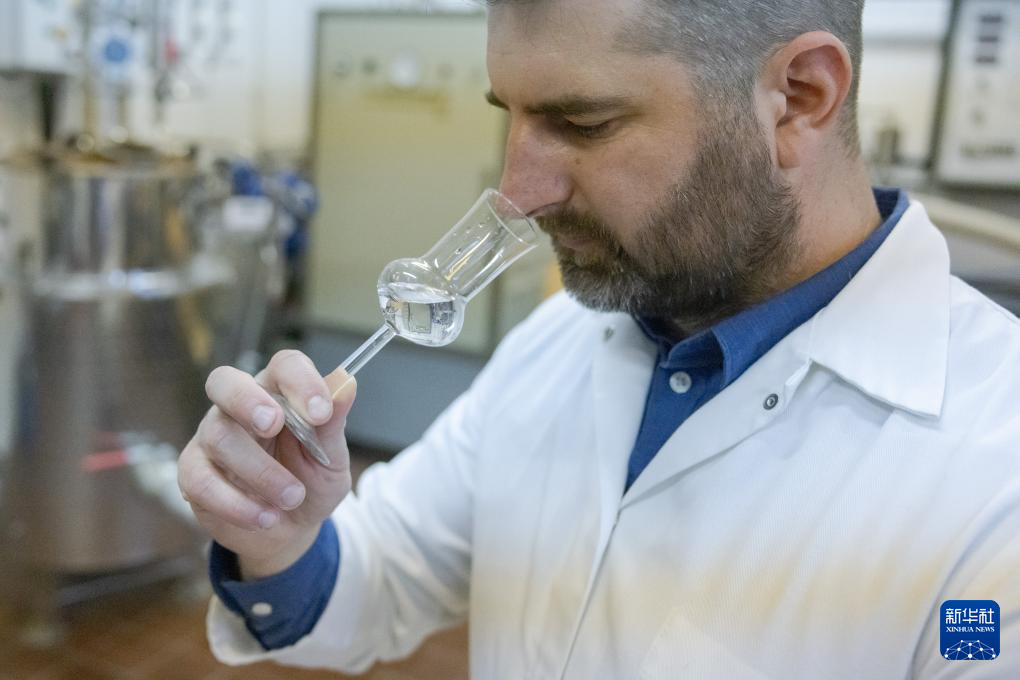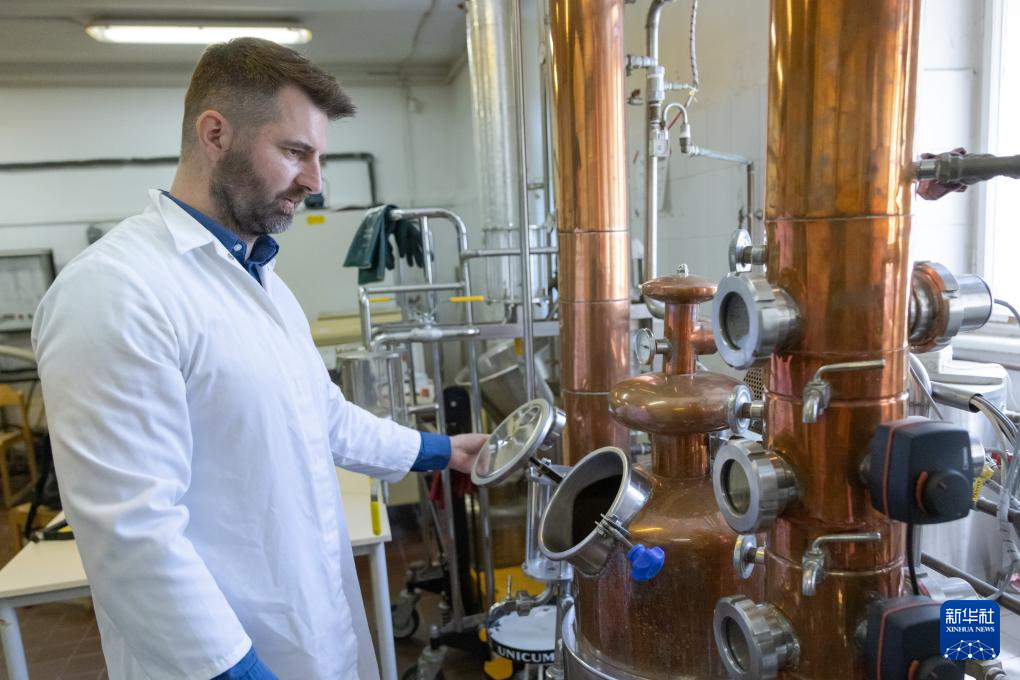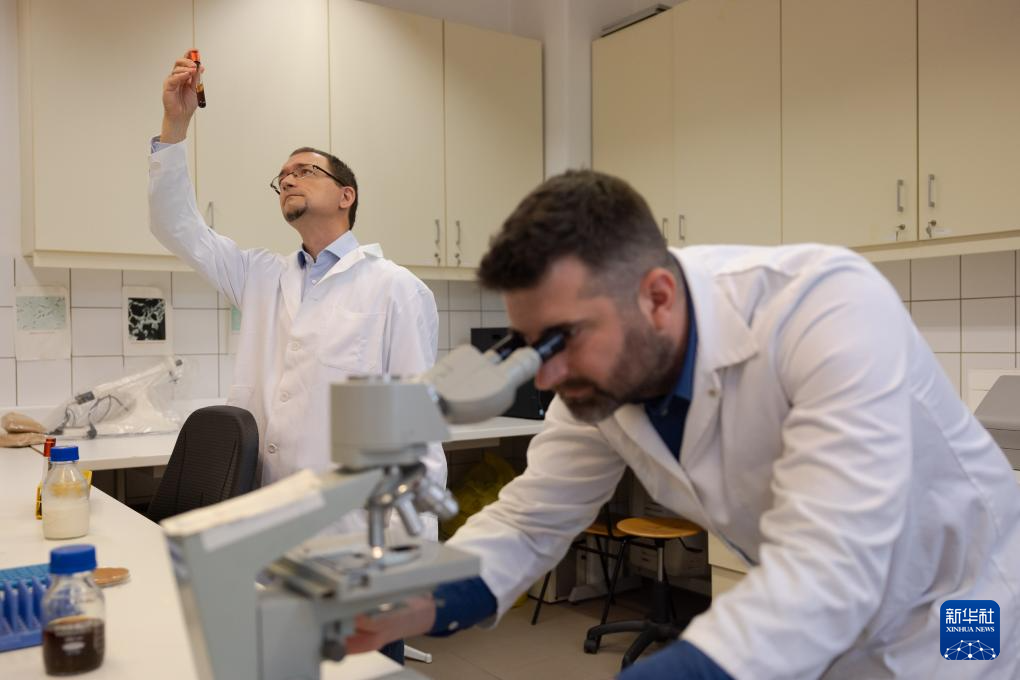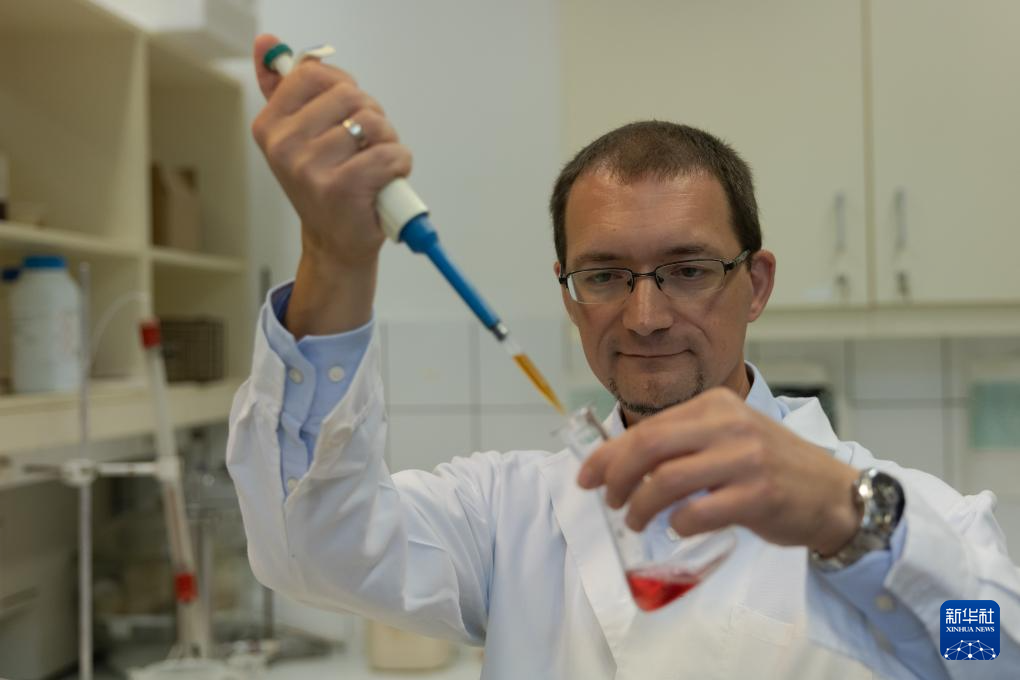“I am delighted to see a series of fruit wines combining Chinese characteristic fruits and Hungarian brewing techniques gradually industrialized!” Speaking of “Qingka” fruit wine, Haiji Ferenc, a researcher at the Hungarian University of Agriculture and Life Sciences, has a glimmer of hope for the future in his eyes.
 On May 27th, in Budapest, Hungary, researcher Heiji Ferenc of the Hungarian University of Agriculture and Life Sciences worked in the laboratory. Xinhua News Agency (Photo by Fergie Otilo)
On May 27th, in Budapest, Hungary, researcher Heiji Ferenc of the Hungarian University of Agriculture and Life Sciences worked in the laboratory. Xinhua News Agency (Photo by Fergie Otilo)
The story will start from 2019. At that time, a cross-border brewing exchange took place at the “China Hungary Fruit Wine Brandy (Palinka) Research Laboratory” located at Southwest University in Chongqing. Haiji, dressed in a white research suit, earnestly showcased the secrets of Hungarian fruit wine brewing to the teachers and students of the School of Food Science at Southwest University.
With the efforts of researchers from both China and Hungary, local excellent fruits such as citrus, crispy plum, and kiwifruit from Chongqing have been produced into the “Qingka” series of fruit distilled spirits through the exquisite brewing techniques of Hungary. At multiple important foreign affairs events, it has attracted a lot of attention and won widespread praise for its unique taste and aroma.
 On May 27th, in Budapest, Hungary, researcher Heiji Ferenc of the Hungarian University of Agriculture and Life Sciences worked in the laboratory. Xinhua News Agency (Photo by Fergie Otilo)
On May 27th, in Budapest, Hungary, researcher Heiji Ferenc of the Hungarian University of Agriculture and Life Sciences worked in the laboratory. Xinhua News Agency (Photo by Fergie Otilo)
This “special” fruit wine is a microcosm of technological cooperation and cultural exchange between China and Hungary.
Hungary is the first European country to sign the “the Belt and Road” cooperation document with China. In 2017, the comprehensive strategic partnership between China and Hungary was established. In May of the same year, a special institution emerged – the China Hungary Food Science Cooperation Research Center.
The center is jointly built by the School of Food Science at Southwest University and the Institute of Food Science at the University of Agriculture and Life Sciences of Hungary. The establishment of the center not only signifies deep cooperation between the two sides in the field of food, but also builds a new platform for scientific and cultural exchanges between China and Hungary.
 On May 27th, in Budapest, Hungary, researchers Heiji Ferenc (former) and Zoran Jolte from the Hungarian University of Agriculture and Life Sciences were working in the laboratory. Xinhua News Agency (Photo by Fergie Otilo)
On May 27th, in Budapest, Hungary, researchers Heiji Ferenc (former) and Zoran Jolte from the Hungarian University of Agriculture and Life Sciences were working in the laboratory. Xinhua News Agency (Photo by Fergie Otilo)
Recalling the opportunity for the birth of the center, Professor Du Muying from the School of Food Science at Southwest University is full of emotion. In 2003, Du Muying went to Hungary to study under scholarships from both countries. “Years of communication and cooperation have built a deep trust between us and our Hungarian counterparts. In order to strengthen cooperation in food science, we decided to jointly establish a research center in 2017,” said Du Muying.
Since the establishment of the center, researchers from China and Hungary have been working side by side to promote collaborative research and development of key technologies in food science. Through a series of technological projects, both parties have not only solidified the foundation of cooperation, but also expanded the perspective of international food science cooperation, transformed scientific and technological achievements into practical benefits, and achieved mutual benefit and win-win.
 On May 27th, Zoran Jolte, a researcher at the Hungarian University of Agriculture and Life Sciences, worked in the laboratory in Budapest, Hungary. Xinhua News Agency (Photo by Fergie Otilo)
On May 27th, Zoran Jolte, a researcher at the Hungarian University of Agriculture and Life Sciences, worked in the laboratory in Budapest, Hungary. Xinhua News Agency (Photo by Fergie Otilo)
“Through in-depth exploration of microbial resources in food between China and Hungary, our research has made significant progress in crop disease prevention and yield improvement.” Director of the center, Kan Jianquan, stated that this cooperation platform not only injects new vitality into scientific research between China and Hungary, but also becomes an important link connecting China with other countries such as Egypt, Spain, and Russia, promoting continuous deepening of international cooperation.
Zoran Jolte, a researcher at the Hungarian University of Agriculture and Life Sciences, stated that in the future, the two sides will promote cooperation in broader research fields, strengthen inter school youth talent exchanges, and continue to inject new momentum into scientific development through complementary advantages.
Looking ahead to the future, Du Muying has a firm gaze. She said that the center will continue to work hard to promote the “Qingka” series of fruit distilled spirits to more markets. “We look forward to these fruit wines entering thousands of households in Hungary and crossing national borders to reach the world,” said Du Muying.
